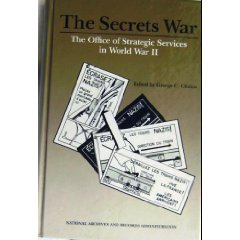April 8, 2000
George C. Chalou
Twenty four distinguished authors, including Sir Robin Brook from England and William Colby, an original serving member of the OSS and later DCI, provide a really well-developed history of the OSS with special sections on OSS records and OSS research, as well as grouped contributions on OSS operations in various regional areas and reflections on today's circumstances. One contributor, Robin Winks, concludes that US intelligence (CIA) is not getting “the right stuff” now for four interlocking reasons: 1) academia by and large no longer cooperates with the intelligence community; 2) academia lost its interest in being helpful when it became apparent that the covert action tail was wagging the intelligence dog; 3) the intelligence community, apprehensive about recruiting from open institutions permitting violent war protests, made the clearance process so convoluted that it began averaging eighteen months; and 4) the agency began to recruit people who badly wanted to join and were willing to put up with a recruitment and clearance process that the best Yale students, the ones who withdrew from consideration, described as “curious, stupid, degrading, and off-putting”, with the result that the agency ultimate lost access to “the self-assured, the confident, the questioning, and the adventurous-precisely the qualities that has been so attractive to the OSS-in the process.” I myself know from discussions with the head of the office responsible for evaluating incoming Career Trainees, that the standard profile of a desirable candidate has always been “the company man” who goes along, except in two years-1979 and 1982-when they went after “self-starters.” Within five years, both those classes lost fifty percent of their numbers to resignation, and I believe that this problem continues to persist. I was in the 1979 class, and hung in there for nine years.
Twenty four distinguished authors, including Sir Robin Brook from England and William Colby, an original serving member of the OSS and later DCI, provide a really well-developed history of the OSS with special sections on OSS records and OSS research, as well as grouped contributions on OSS operations in various regional areas and reflections on today's circumstances. One contributor, Robin Winks, concludes that US intelligence (CIA) is not getting “the right stuff” now for four interlocking reasons: 1) academia by and large no longer cooperates with the intelligence community; 2) academia lost its interest in being helpful when it became apparent that the covert action tail was wagging the intelligence dog; 3) the intelligence community, apprehensive about recruiting from open institutions permitting violent war protests, made the clearance process so convoluted that it began averaging eighteen months; and 4) the agency began to recruit people who badly wanted to join and were willing to put up with a recruitment and clearance process that the best Yale students, the ones who withdrew from consideration, described as “curious, stupid, degrading, and off-putting”, with the result that the agency ultimate lost access to “the self-assured, the confident, the questioning, and the adventurous-precisely the qualities that has been so attractive to the OSS-in the process.” I myself know from discussions with the head of the office responsible for evaluating incoming Career Trainees, that the standard profile of a desirable candidate has always been “the company man” who goes along, except in two years-1979 and 1982-when they went after “self-starters.” Within five years, both those classes lost fifty percent of their numbers to resignation, and I believe that this problem continues to persist. I was in the 1979 class, and hung in there for nine years.



